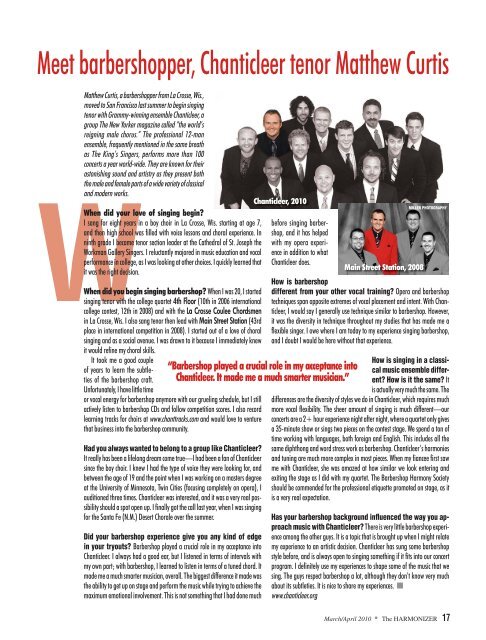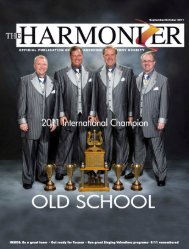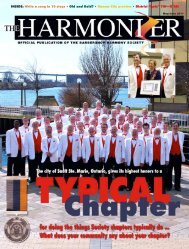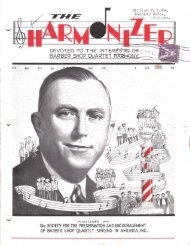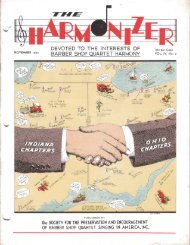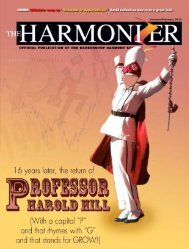about barbershop - eBiz - Barbershop Harmony Society
about barbershop - eBiz - Barbershop Harmony Society
about barbershop - eBiz - Barbershop Harmony Society
You also want an ePaper? Increase the reach of your titles
YUMPU automatically turns print PDFs into web optimized ePapers that Google loves.
Meet <strong>barbershop</strong>per, Chanticleer tenor Matthew Curtis<br />
Matthew Curtis, a <strong>barbershop</strong>per from La Crosse, Wis.,<br />
moved to San Francisco last summer to begin singing<br />
tenor with Grammy-winning ensemble Chanticleer, a<br />
group The New Yorker magazine called “the world’s<br />
reigning male chorus.” The professional 12-man<br />
ensemble, frequently mentioned in the same breath<br />
as The King’s Singers, performs more than 100<br />
concerts a year world-wide. They are known for their<br />
astonishing sound and artistry as they present both<br />
the male and female parts of a wide variety of classical<br />
and modern works.<br />
W<br />
When did your love of singing begin?<br />
I sang for eight years in a boy choir in La Crosse, Wis. starting at age 7,<br />
and then high school was filled with voice lessons and choral experience. In<br />
ninth grade I became tenor section leader at the Cathedral of St. Joseph the<br />
Workman Gallery Singers. I reluctantly majored in music education and vocal<br />
performance in college, as I was looking at other choices. I quickly learned that<br />
it was the right decision.<br />
When did you begin singing <strong>barbershop</strong>? When I was 20, I started<br />
singing tenor with the college quartet 4th Floor (10th in 2006 international<br />
college contest, 12th in 2008) and with the La Crosse Coulee Chordsmen<br />
in La Crosse, Wis. I also sang tenor then lead with Main Street Station (43rd<br />
place in international competition in 2008). I started out of a love of choral<br />
singing and as a social avenue. I was drawn to it because I immediately knew<br />
it would refine my choral skills.<br />
It took me a good couple<br />
of years to learn the subtleties<br />
of the <strong>barbershop</strong> craft.<br />
Unfortunately, I have little time<br />
or vocal energy for <strong>barbershop</strong> anymore with our grueling schedule, but I still<br />
actively listen to <strong>barbershop</strong> CDs and follow competition scores. I also record<br />
learning tracks for choirs at www.chanttracks.com and would love to venture<br />
that business into the <strong>barbershop</strong> community.<br />
Had you always wanted to belong to a group like Chanticleer?<br />
It really has been a lifelong dream come true—I had been a fan of Chanticleer<br />
since the boy choir. I knew I had the type of voice they were looking for, and<br />
between the age of 19 and the point when I was working on a masters degree<br />
at the University of Minnesota, Twin Cities (focusing completely on opera), I<br />
auditioned three times. Chanticleer was interested, and it was a very real possibility<br />
should a spot open up. I finally got the call last year, when I was singing<br />
for the Santa Fe (N.M.) Desert Chorale over the summer.<br />
Did your <strong>barbershop</strong> experience give you any kind of edge<br />
in your tryouts? <strong>Barbershop</strong> played a crucial role in my acceptance into<br />
Chanticleer. I always had a good ear, but I listened in terms of intervals with<br />
my own part; with <strong>barbershop</strong>, I learned to listen in terms of a tuned chord. It<br />
made me a much smarter musician, overall. The biggest difference it made was<br />
the ability to get up on stage and perform the music while trying to achieve the<br />
maximum emotional involvement. This is not something that I had done much<br />
Chanticleer, 2010<br />
before singing <strong>barbershop</strong>,<br />
and it has helped<br />
with my opera experience<br />
in addition to what<br />
Chanticleer does.<br />
“<strong>Barbershop</strong> played a crucial role in my acceptance into<br />
Chanticleer. It made me a much smarter musician.”<br />
Main Street Station, 2008<br />
MILLER PHOTOGRAPHY<br />
How is <strong>barbershop</strong><br />
different from your other vocal training? Opera and <strong>barbershop</strong><br />
techniques span opposite extremes of vocal placement and intent. With Chanticleer,<br />
I would say I generally use technique similar to <strong>barbershop</strong>. However,<br />
it was the diversity in technique throughout my studies that has made me a<br />
flexible singer. I owe where I am today to my experience singing <strong>barbershop</strong>,<br />
and I doubt I would be here without that experience.<br />
How is singing in a classical<br />
music ensemble different?<br />
How is it the same? It<br />
is actually very much the same. The<br />
differences are the diversity of styles we do in Chanticleer, which requires much<br />
more vocal flexibility. The sheer amount of singing is much different—our<br />
concerts are a 2+ hour experience night after night, where a quartet only gives<br />
a 35-minute show or sings two pieces on the contest stage. We spend a ton of<br />
time working with languages, both foreign and English. This includes all the<br />
same diphthong and word stress work as <strong>barbershop</strong>. Chanticleer’s harmonies<br />
and tuning are much more complex in most pieces. When my fiancee first saw<br />
me with Chanticleer, she was amazed at how similar we look entering and<br />
exiting the stage as I did with my quartet. The <strong>Barbershop</strong> <strong>Harmony</strong> <strong>Society</strong><br />
should be commended for the professional etiquette promoted on stage, as it<br />
is a very real expectation.<br />
Has your <strong>barbershop</strong> background influenced the way you approach<br />
music with Chanticleer? There is very little <strong>barbershop</strong> experience<br />
among the other guys. It is a topic that is brought up when I might relate<br />
my experience to an artistic decision. Chanticleer has sung some <strong>barbershop</strong><br />
style before, and is always open to singing something if it fits into our concert<br />
program. I definitely use my experiences to shape some of the music that we<br />
sing. The guys respect <strong>barbershop</strong> a lot, although they don’t know very much<br />
<strong>about</strong> its subtleties. It is nice to share my experiences. �<br />
www.chanticleer.org<br />
March/April 2010 • The HARMONIZER 17


